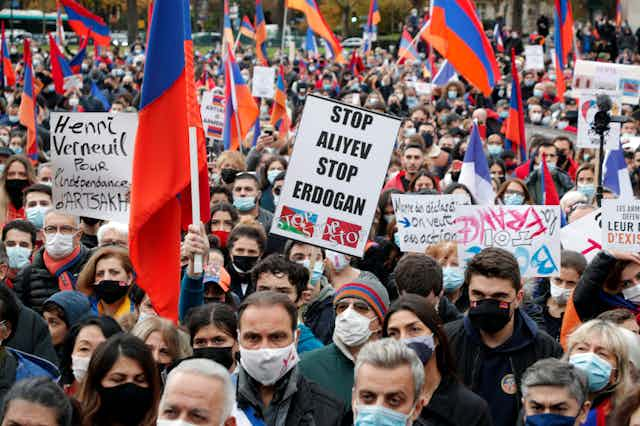The signing of a deal to halt the violence in the disputed enclave of Nagorno-Karabakh in the South Caucasus may have brought a six-week breathing space to the troubled region. But there is already evidence that the ceasefire, while warmly greeted by Azerbaijanis, has been roundly rejected in Armenia, which has been forced to cede territory.
There were protests in the Armenian capital of Yerevan after prime minister, Nikol Pashinyan, announced details of what he called a “painful” deal. The parliament was briefly occupied and the speaker beaten by an angry mob.
Meanwhile, Armenian, Azerbaijani and Turkish diasporas have strongly reacted to the conflict. On September 28, Armenia’s high commissioner for diaspora affairs, Zareh Sinanyan, issued a thinly veiled call to arms to the Armenian diaspora:
In this war we are all soldiers and all have an important role to play. The time has come for each of us to stand ready to do our part, each within our means, to defend our nation and our land.
Armenians living overseas had already been keen to contribute to the cause since violence erupted on September 27, either by sending remittances or by joining the war themselves as fighters.
The Azerbaijani diaspora has also been active, organising demonstrations and collecting humanitarian aid for wounded soldiers and their families. Although the conflict is specific to the Azerbaijan-Armenian context, Turkey is heavily involved too – with direct political and military support being provided to Azerbaijan and through its domestic and diaspora populations’ activities.
Tensions turn violent
Before Azerbaijan’s September offensive, the conflict had been mostly dormant since the truce that ended the Nagorno-Karabakh War in 1994. But tensions between diasporas had remained high thanks to a range of unresolved issues, such as recognition of the 1915 Armenian genocide.
Read more: It's time the world recognised the Armenian genocide
On October 28, Turkish and Azerbaijani nationals in Lyon, France, were filmed marching towards Armenian neighbourhoods chanting “Allahu Akbar” (God is Great) and “Where are the Armenians?”. One day before this event, there had been violent clashes between the two groups, also in Lyon, when Armenian protesters blocked a highway.

A few days later, on October 31, a French memorial to the Armenian genocide in Lyon was defaced with slogans promoting Turkish ultra-nationalist organisation the Grey Wolves. The French government responded by banning the group, citing its “incitement to hatred against authorities and Armenians”.
Tensions between Armenians and Turks in France have played out amid wider religious tensions and violence in the country.
Clashes between the various diaspora communities elsewhere have underscored the bitterness of the conflict. In Boston, Armenian demonstrations were disrupted by local Azeri nationals and there were reports that some Armenians had been physically attacked. In Los Angeles, one person was arrested and several people, including a police officer, were injured after a peaceful protest by organised by the Armenian Youth Federation turned violent at the Azerbaijan Consulate in the suburb of Brentwood. Meanwhile, Armenian nationals attacked a Turkish restaurant in Beverly Hills, vandalising the premises and physically assaulting staff members.
A complex dynamic
But Turkey has been making an effort to organise its overseas communities during the past decade and has developed the capacity to use them to send clear messages to Armenian communities and their host countries. The thrust of this has been to work with Azeri communities to counter Armenian narratives about the Nagorno-Karabakh conflict and the 1915 genocide.

The Armenian diaspora itself also reads what is happening in Nagorno-Karabakh through the prism of historical Armenian-Turkish relations rather than in terms of Armenian-Azerbaijani relations. In particular, Armenian protesters tend to frame the current events by referring to the 1915 genocide, although it is not directly related to the current conflict, and to treat the Azeri-Turkish bloc as a monolithic threat towards Armenian existence and survival.
Recent events show that homeland conflicts can easily be transported to third-party countries – especially when they escalate, as the Nagorno-Karabakh conflict has recently. Tensions between communities can be rekindled within minutes and relations can quickly worsen.

